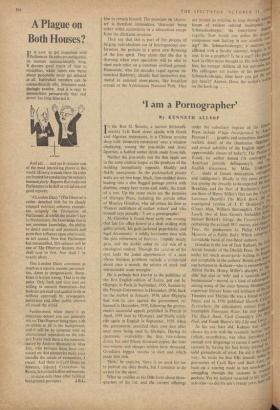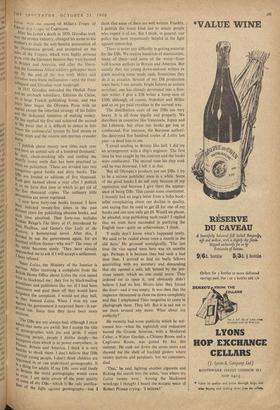`I am a Pornographer'
By KENNETH ALLSOP
N the Rue St. Severin, a narrow thirteenth- _l_century Left Bank street ajostle with Greek and Algerian restaurants, is a Chinese novelty shop with 'PRODUITS EXOTIQUES' Over a window displaying, among the joss-sticks and ivory figurines, a bottled amber drink made from fish.
Neither the joss-sticks nor the fish tipple are in the same exotica league as the products of the building immediately opposite, blankly and flakily anonymous. in the pockmarked plaster walls are set two huge, black, iron-studded doors leading into a dim flagged passage strewn with dustbins, empty beer crates and, oddly, the trunk of a tree. Up the stone stairs are the premises of Olympia Press, including the private office of Maurice Girodias, who advertises his firm as `Pioneer publishers of outlaw writers' and who himself says proudly: '1 am a pornographer.'
M. Girodias is found there early one evening (but late for office hours) at a desk swilling with galley-proofs, his gaily-jacketed paperbacks, and legal documents: a mildly handsome man with the pale refinement of features, limpidly steady gaze, and the drably sober tie and suit of a theological student. Through the candour of his eyes leaks the jaded apprehension of a man whose business problems include a police-raid about once a month, the seizure of stock and interminable court wrangles.
He is perhaps -best known as the publisher of the first English edition. of Lolita, put out by Olympia in Paris in September, 1955, banned by the French Government in December, 1956, back on the market in January, 1958, after Olympia had won its case against the government, re- banned in December, 1958, following the govern- ment's successful appeal, published in French in April, 1959 (not by Olympia), and finally safely rife again in English in September, 1959, when the government cancelled their own ban after once more being sued by Olympia. During its spasmodic availability the first two-volume Lolita has sold fifteen thousand copies, the later one-volume and cheaper edition forty thousand, Girodias's .biggest success to date and which made him rich.
'Now,' he explains, 'there is no need for me to publish my dirty books, but I continue to do so just for the sport.'
What he codifies as his DBs form about three- quarters of his list, and the current offerings
under the subsidiary imprint of the (*lel,' Press include Whips Incorporated by Angell Pearson C. . . graphic and sometimes sl tockit realistic detail of the clandestine 1146°1'1.'8 and sexual activities of the English LIPPer upper-middle classes of today'), The Passicir Youth, no author named C nio"A cos b
OnY °
American juvenile delinquency'), and ed English Governess, by Miles Under"°: n ('. . . study of female domination, corruPb- and indulgence'). Hardly in this same categ°7' ee' but among the drearily to-be-expected De S Beardsley and the Earl of Rochester's Satyr are three of Henry Miller's (but not the Tri)Pics'. Lawrence DurrelEs' The Black Book, the ljn expurgated version of J. P. DonleavYs /ht . Satteri Ginger Man, William Burroughs's The ..k Lunch, two of Jean Genet's forbidden work k. s Samuel Beckett's trilogy, the Casement niar containing the excised 1911 entries, and Steiner.., Tour, the predecessor to Philip 0 Conn°r; Memoirs of a Public Baby. Which comprises formidable band of two-fisted outlaws. Girodias is the son of Jack Kahane, the °all; Jewish founder 'of the Obelisk Press, the car_ - outlet for much avant-garde writing 111 I not acceptable in the authors' British and Alli:hr; can hometowns. Kahane—who is remolds:fel° Alfred Perlis, Henry Miller's disciple' or able' but also as 'wily' and a `cautious and c businessman'--moved as a kind of talent-sP4,e among many of the since famous MontParriliksic expatriate literary bums and brilliants of the Twenties and Thirties. He was a friend of laril`' Joyce, and in 1930 published Ilaveth Childerce Everywhere, the anticipatory extract front tiled incomplete Finnegans Wake. He also 11°1°4 The Black Book, Cyril Connolly's 70 14°‘ Pool, and Frank Harris's My Life and Loves. As his son later did, Kahane was able ILl chance his arm with the eccentric 'serious b°.th (which, nevertheless, was often furnished kin d°$ enough sexy dingdongs to ensure it some custom) by having his feet firmly planted °II f the ha thesolid groundwork of smut. He did it tl under 'ad way : he wrote his first DBs himself, pen-names of Cecil Barr and Basil cart, 3-1 built up a roaring trade in hot novelettes smuggling through the customs in. ”' .serio;
pockets. Yet his jackpot occurred in his activities—as did his son's twenty years later
L'itiu with the issuing of Miller's Tropic of Cancer and l ,opic of Capricorn. After his father's death in 1939, Girodias took over the erotica industry, changed his name to his mother's to elude the anti-Semitic persecution of the Occupation period, and prospered on the sales of the Tropics, which were highly persona Mita with the Germans because they were banned in Britain and America, and after the libera- tion the licentious Allied soldiery gollopped them °1:1 BY the end of th,_, war both Miller and Girodias were /franc millionaires—until the franc collapsed and Girodias went bankrupt. In 1951 Girodias unloaded the Obelisk Press and an art-book subsidiary, Editions du Chene, a large French publishing house, and two Years later began the Olympia Press with no capital except the inherited strategy of his father and the dedicated intention of making money. He has applied the first and achieved the second t°, the point that it is difficult to detect in him f/‘'nere the commercial tycoon by foul means or sktoaurltesr. stops and the sincere anti-puritan crusader publish about twenty new titles each year and have an annual sale of a hundred thousand,' 11,,,e says, chain-smoking idly and smiling the ironic smile that has been practised so ten on policemen. 'These are divided into two categories—good books and dirty books. The DBs are limited to editions of five thousand. Each gets banned about a year after 1 publish thso we have that time in which to get rid of e five thousand copies. The ordinary little nbscenities are never reprinted. 1 now have forty-one books banned. I have been indicted twenty-five times in the past years for publishing obscene books, and each time absolved. That forty-one includes Pauline Rdage's The Story of 0, introduced by Jean Paulhan, and Genet's Our Lady of the dif)1VerS, a homosexual novel. After this, I Lrinhundred to sue the government again, for six odred million francs—why not?' The irony of ntS smile becomes steely. 'They have already a PProached me to ask if I will accept a settlement. , have refused. `Since Lolita, the Ministry of the Interior is nervous. After receiving a complaint from the British Home Office about Lolita the vice squad tried to blackmail me: they live by blackmailing Prostitutes and publishers like me. If I had been ".nhnlissive and paid them off, they would have forgotten the complaint. I would not play ball, SO they banned Lolita. When I won my case against the government it surprised them—it stir- Prised me. Since then they have been more cautious, admit DBs are not always bad, although I must ;114 that some are awful. But I accept the title at Pornographer with joy and pride. I enjoy 1.,114°Ying people, people I dislike deeply—the France class which is in power everywhere, in allee, Britain and America. I think it is very corrupt to shock them. I don't believe that DBs .tiorrupt young people. I-don't think children are interested in or can understand pornography. It a thing for adults. If my DBs were sold freely in Britain the word pornography would cease ni, exist. I am quite aware of the poor quality some of my DBs—which is the only justifica- tion of the fight against pornography—but I think that some of them are well written. Frankly, I publish the worst kind just to annoy people who expect it of me. But I think, in general, our policy has been importantly helpful in the fight against censorship.
'There is never any difficulty in getting material for the DBs. We receive hundreds of manuscripts, many of them—and some of the worst—from well-known authors in Britain and America. But usually they are young down-and-out writers or poets needing some ready cash. Sometimes they do it as practice. Several of my DB production team have, I am certain, bright futures as serious novelists; one has already developed into a first- rate writer. I give a DB writer a lump sum of £300, although, of course, Nabokov and Miller and so on ire paid royalties in the normal way.
'The distribution costs of our DBs are very heavy. It is all done legally and properly. We distribute in countries like Venezuela, Japan and the Lebanon, but often our books get lost or confiscated. For instance, the Burmese authori- ties destroyed five hundred copies of Lolita last year—a dead loss to me.
'I avoid sending to Britain like hell. I did try an arrangement with a ship's engineer. The first time he was caught by the customs and the books were confiscated. The second time his ship sank and he was drowned. I left it at that.
'But all Olympia's products are not DBs. I try to be a serious publisher once in a while. Some of the good books I do sell only because of my reputation and because I give them the appear- ance of being DBs. This causes some resentment.
I recently had an angry letter from a Soho book- seller complaining about our decline in quality, and saying that he used to get i8 for one of my books and can now only get £4. Would we please, he pleaded, stop publishing such trash? I replied that we must have succeeded in purifying the English race—quite an achievement, I think.
'I really don't know what's happened lately. We used to be raided about once a month in the old days.' He groaned nostalgically. 'The last time the vice squad were here was six months ago. Perhaps it is because they had such a bad time then. I arrived to find six burly fellows quarrelling with my secretary and demanding that she opened a safe, left behind by the pre- vious tenant, which no one could move. They ordered me to open it, and obviously didn't believe I had no key. Hours later they forced the door—and it was empty. It was then that the inspector threatened to close me down completely and that I telephoned Time magazine to come to photograph them. They left. But it is sad not to see them around any more. What about my publicity?'
He recently had some publicity which he wel- comed less—when his nightclub and restaurant named the Grande Severine, with a Mediaeval Cellar, a Winter Garden, a Chinese Room and a Cagliostro Room, was gutted by fire this summer. He took me down the stone stairs and showed me the shell of buckled girders where twenty parrots and parakeets, but no customers, died.
'That,' he said, lighting another cigarette and flicking the match into the ashes, 'was where my Lolita money went.' Among the blackened wreckage I thought 1 heard the ecstatic voice of Robert Pitman crying: 'I believe!'



















































 Previous page
Previous page